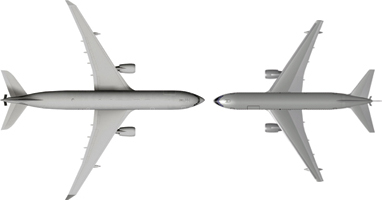Tanker Share Consensus Grows Accordi ng to various news reports, the two rivals for the Air Force’s KC-X tanker replacement program and key lawmakers are ready to split the deal between Boeing and Northrop Grumman, despite continued Pentagon resistance. The Los Angeles Times reported earlier this month that EADS, parent to Airbus which partnered with Northrop on the tanker program, will accept a split; EADS spokesman Pierre Bayle said, “We want to be there whatever the solution.” Associated Press reported last week that Boeing also is ready to split the program; Jim Albaugh, who heads the company’s defense business, told AP, “We are going to support whatever type of acquisition that our customer wants to put in place.” Rep. Neil Abercrombie (D-Hawaii), chairman of the House Armed Services airland panel, has joined forces with top defense appropriator Rep. John Murtha (D-Pa.), an early proponent of the split program approach, to champion the effort. Last week, Abercrombie called into question the cost figures cited by Defense Secretary Robert Gates. And, CongressDaily reports that Sen. Daniel Inouye (D-Hawaii), chairman of the Appropriations Committee, has expressed a willingness to consider a split buy to speed acquisition of new tankers for one key reason: “We need them; there’s no question about that.” In Alabama, which would be the key production site for a Northrop tanker, the Press-Register reports that Sen. Richard Shelby (R), Rep. Jo Bonner (R), and Rep. Artur Davis (D) all would support a split program. Bonner believes it “would be the most direct route” toward fielding a new tanker. Davis called such an approach “our best chance for ending the frustrating political impasse.” And, Shelby acknowledged Congress could overrule the Pentagon and insist on a split, saying, “If that’s the will of Congress, I believe it would prevail.”
ng to various news reports, the two rivals for the Air Force’s KC-X tanker replacement program and key lawmakers are ready to split the deal between Boeing and Northrop Grumman, despite continued Pentagon resistance. The Los Angeles Times reported earlier this month that EADS, parent to Airbus which partnered with Northrop on the tanker program, will accept a split; EADS spokesman Pierre Bayle said, “We want to be there whatever the solution.” Associated Press reported last week that Boeing also is ready to split the program; Jim Albaugh, who heads the company’s defense business, told AP, “We are going to support whatever type of acquisition that our customer wants to put in place.” Rep. Neil Abercrombie (D-Hawaii), chairman of the House Armed Services airland panel, has joined forces with top defense appropriator Rep. John Murtha (D-Pa.), an early proponent of the split program approach, to champion the effort. Last week, Abercrombie called into question the cost figures cited by Defense Secretary Robert Gates. And, CongressDaily reports that Sen. Daniel Inouye (D-Hawaii), chairman of the Appropriations Committee, has expressed a willingness to consider a split buy to speed acquisition of new tankers for one key reason: “We need them; there’s no question about that.” In Alabama, which would be the key production site for a Northrop tanker, the Press-Register reports that Sen. Richard Shelby (R), Rep. Jo Bonner (R), and Rep. Artur Davis (D) all would support a split program. Bonner believes it “would be the most direct route” toward fielding a new tanker. Davis called such an approach “our best chance for ending the frustrating political impasse.” And, Shelby acknowledged Congress could overrule the Pentagon and insist on a split, saying, “If that’s the will of Congress, I believe it would prevail.”
After months of debate and sometimes public tension, the Space Force and Intelligence Community are making progress on establishing ways to work together, officials said this week—to the point where one predicted there will soon be “a sharing of data like we've never seen before.”